I stretch my neck, stiff from last night’s sleep. Outside my window, the low, calm water is more a broken, gray mirror that cuts through rows of pine. Strands of fog blend into the clouds overhead. The rolling mountains in the distance.
I’m looking at Shasta Lake, though without context I’d think it was a river—the lake was formed in 1948 after the complete damming of the Sacramento. I check my phone. I’ve been on this train nearly 20 hours. Sitting in this reclining coach seat. Soon the train will continue north alongside the Sacramento as we approach Klamath Falls, Oregon. By the time I exit the train in Lacey, Washington, I will have ridden for some 35 hours.
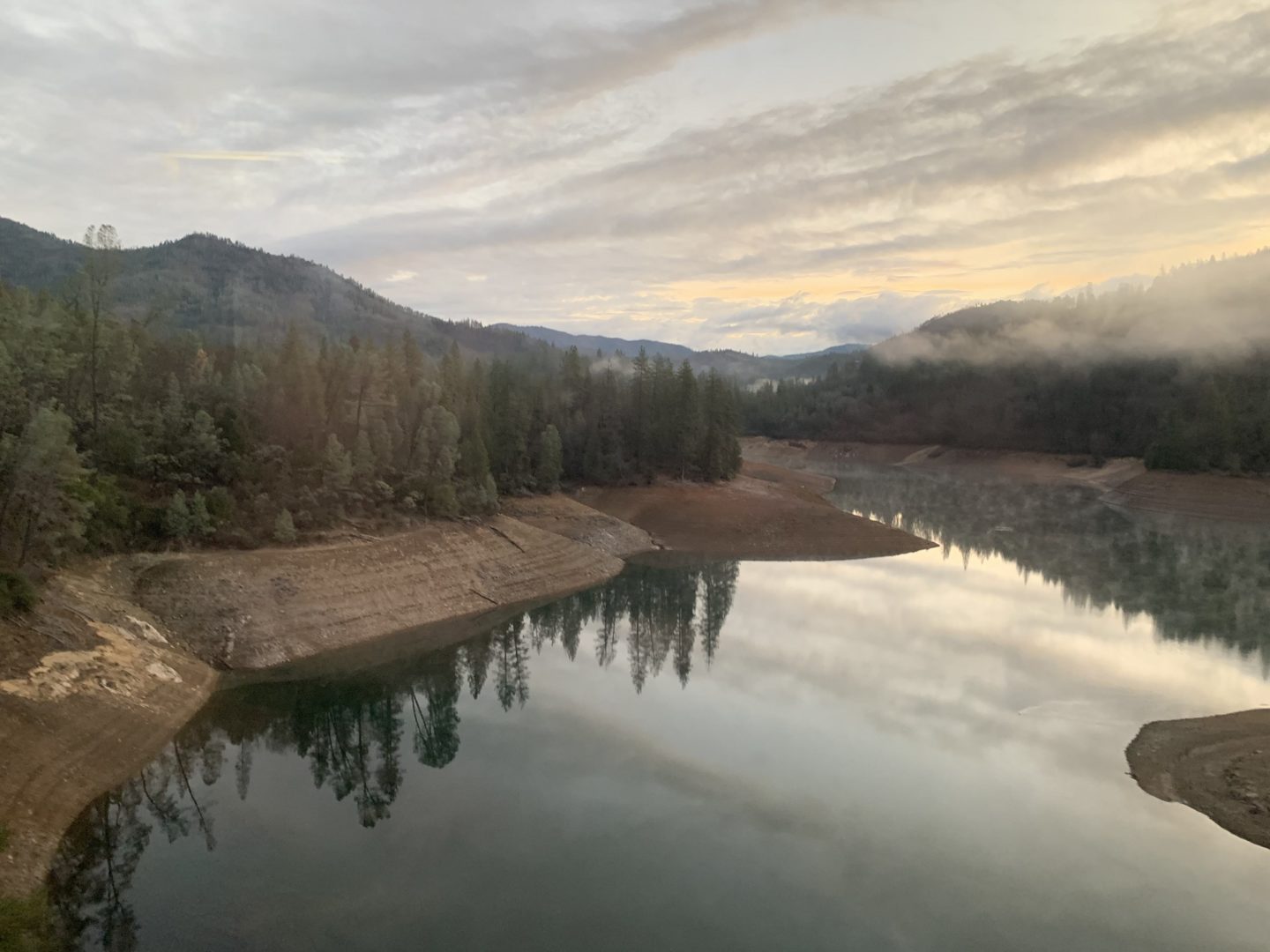
Credit: Jacob Farmer
Dehydrated and still in a pre-coffee fog, I wonder why I embarked on a solo trip that can be completed in two hours by plane. Also unsettling to me: Why did the journey seem reminiscent of some hazy memory of mine? A memory not actually lived, but still experienced in a real way. Had I not been on a train just last month, or last week, in an alternate universe, one that resembled Northern California but also didn’t? Couldn’t pinpoint it that exactly.
I laugh to myself as the mental puzzle piece snaps into place. I had been on a train, yes, just last week, travelling through mountains quite like these, only I knew them as the Grizzlies West, not the Cascades.
I had been playing Red Dead Redemption 2.
It’s been said that Red Dead Redemption 2 is less a game about cowboys and more a cowboy simulator. The sim is operating at its best when the little, mundane, seemingly inconsequential actions—skinning a buck, having a beer in a saloon, singing a song around campfire—feel as vital and important to the journey as those yellow letters on the map that signal plot advancement, story, completion.
For those not expecting or wishing for such a drawn out, deliberate pace, the game can be frustrating. It can be tedious, slow, boring. For others, that same level of detail makes it all the more entrancing. For me, and I truly don’t mean to be hyperbolic, it verged on life-altering.
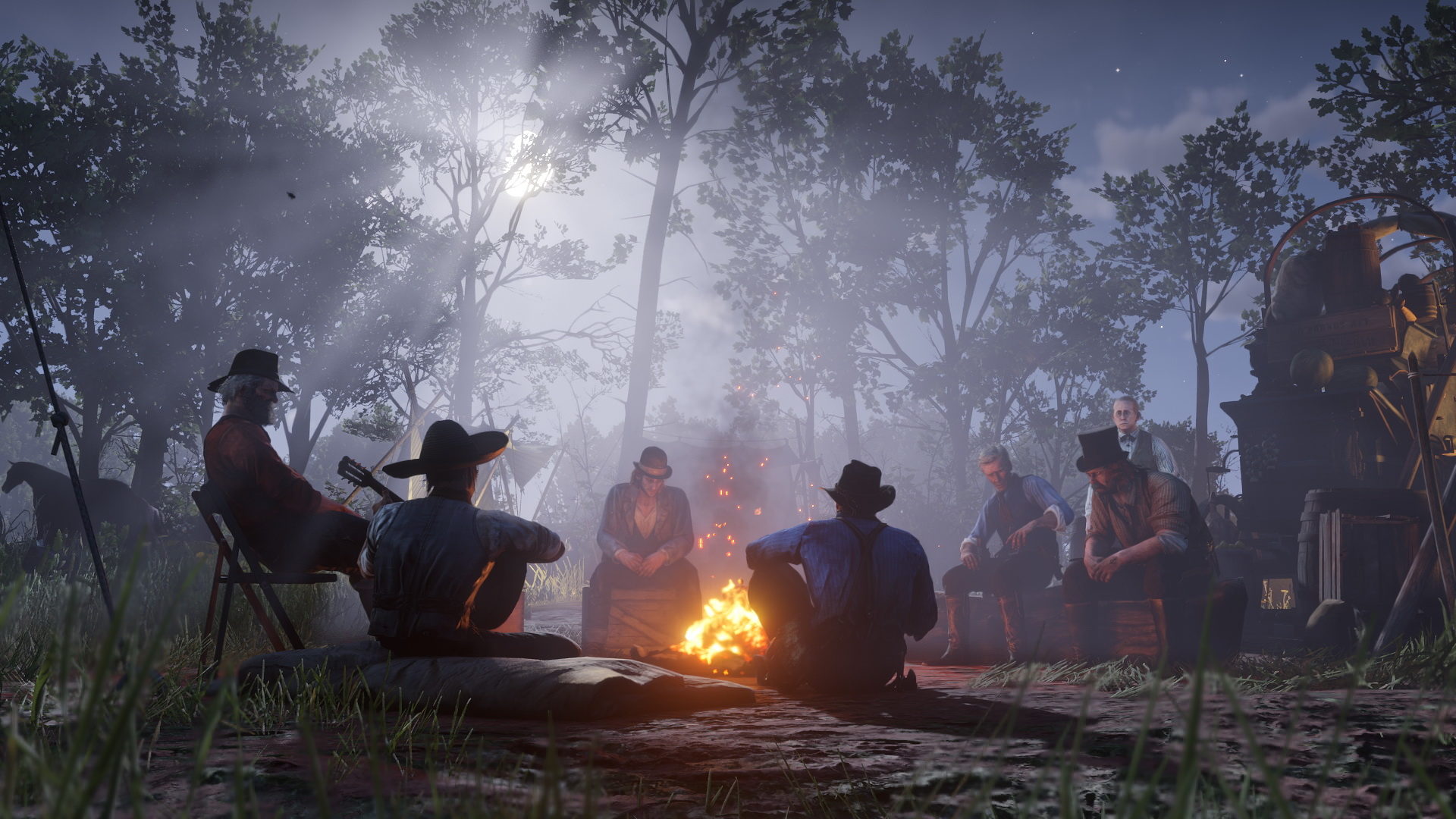
It started like this. One night, before possessing the knowledge of a certain affliction that heightens the moral and existential quandary to come, I, as Arthur Morgan, made the decision to leave the gang’s camp. With no destination in mind, I traveled north along the Kamassa River, out of the lush, humid swampland of Lemoyne, past the seedy Van Horn trading post and into the Roanoke Ridge, before settling somewhere down in the valley. I pitched my tent by the river, donned my warmest deerskin attire and my fox hat, and I fished. And fished. And fished. As the day turned into night, I sat by the crackling fire, watching the stars overhead. I read from my journal, embracing the calmness, the solitude, before retiring to my bedroll.
I continued the next day in the same way. Fishing, cooking, watching the stars. What must have been a week in game time was certainly hours in real life. I went to bed that night at 5 a.m., convinced that I, still thinking as Arthur Morgan, needed that respite from Dutch and the others. I slept well, confident my return to camp would be welcome and that I would have a renewed sense of purpose for the collective work yet to be done.
The transformation had begun.
In the weeks that followed, a sort of dual existence began, a jarring perceptual schism. Mornings were met with confusion. Had I not enjoyed a home cooked meal by the fire last night? Did I not indulge in five beers and best a table of strangers at poker? (I did, in fact, have a Stone IPA, an anachronism, I’d realize.)
Am I now getting in my car, inching through Los Angeles traffic? 9 a.m. Rush hour. I’m at my office now. Opening my laptop. Fluorescent lighting above. Nine hours ticking away. Back home. Turn the TV on. Pick up the controller.
Do I really want to enter this dream world again? The one that’s so hard to leave?
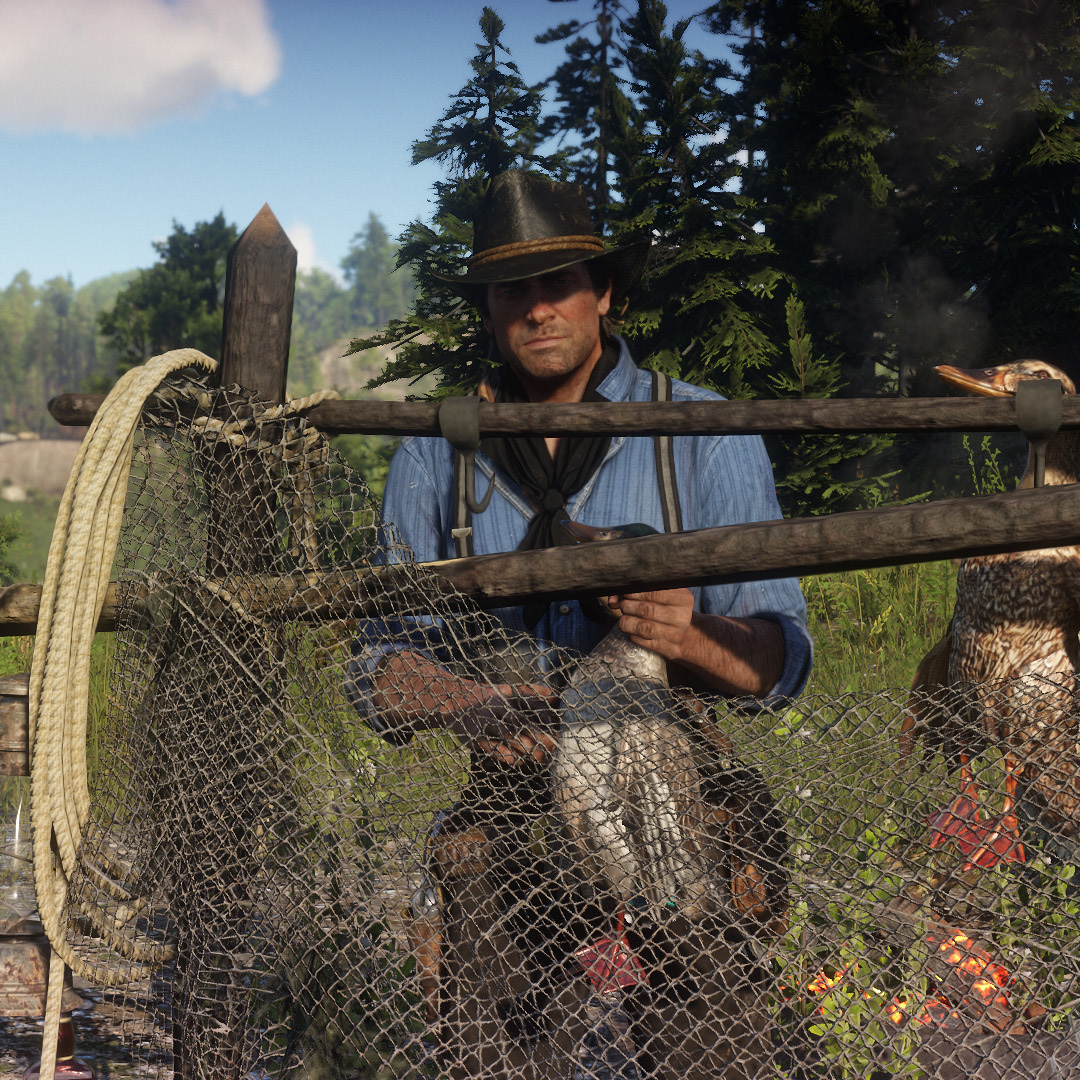
Then, in my real life, or my “waking life” as I began thinking of it, I started experiencing moments differently. What before were routine, thoughtless chores—make coffee, floss teeth, have a shave—now were tasks fit with a new self-imposed meaning. These little sections in a day that were too often filled with other thoughts (what’s for dinner? did I really say that yesterday? what did she mean? am I projecting?) were now being purposefully executed. And not just executed, but witnessed, participated in, maybe even enjoyed. Perhaps inconsequential by themselves, in totality they summed up to a better version of myself. I was, as the cliché states, living in the moment.
Why? Because I was relearning that a simple action yields a reward. Oiling my Schofield revolver increases its accuracy. Patting my Appaloosa increases bonding. Flossing my teeth makes me feel just a little bit better about my smile, which increases the chance that I might smile throughout a day, which increases the odds I might mentally register this day as a good one.
Red Dead Redemption 2, a game that required me to push a button on a controller to scrub a limb, brush a horse, heat a cup of coffee, and then reward me in some small but recognizable way, had taught me a lesson in being present and mindful.
In this way the game transcended its limitations as merely a cowboy simulator; it was impacting my perception of time or, more accurately, time spent outside the game. Soon, it would impact my decision-making, my curiosities, and illuminate my personal connection to the complicated legend of the great American West.
I’m working on a glass of wine in the observation car—fit with wall-to-wall windows and near panoramic views of rural Northern California—when a young woman behind me asks me where I’m heading. This, I’ve come to realize, is simply common train etiquette. Lacey, Washington, I tell her. She tells me she’s visiting her family in Seattle, and I can sense the occasion carries some weight. When I inquire, she speaks openly, if circuitously, about having to leave her boyfriend in the middle of the night. About how she’s looking forward to seeing her mother, and finally getting her driver’s license. “Have you seen Chucky?” she asks me. “I’m getting him tattooed on my arm.” We talk more about horror movies, TV, writing, before settling back into silence. A chatty teenage boy approaches her, asks if he can sit down.
I work my way back to my designated car, their laughter lifting behind me.
There are many encounters like this in Red Dead Redemption 2. Encounters that are easy to miss. That can be missed. Designed as choices, these moments become decisions to be triaged. Do you finish the mission or investigate that haunting voice in the woods calling for help? Walk by the crowded campfire on your way into Saint Denis and you’ll miss that heart-rending story about Lenny’s father, born into slavery. Ignore Mary-Beth and you may never hear of her aspirations to be a writer. Tell that woman on the train you’re too busy (doing what, exactly?) and you won’t hear the story of someone who escaped domestic turmoil, who’s not afraid to take it one day at a time, who finally feels ready for something new. Anything new, she tells you, eyes glistening from some untold memory and that cup of vodka and soda.
There’s a common, popular fear that the evolution of video games, and their inevitable culmination in virtual reality, will someday supplant our desire to prioritize what we do in the real world. Mongers will conjure up images of a verbally and emotionally stunted, adult-sized child, afraid to make eye contact, their anxiety only assuaged by the nearest screen or controller. This fear extends beyond prioritizing virtual interactions over face-to-face interactions and includes the abandonment of traditional recreational pursuits. Consider this: Why fight traffic to hike to the top of a crowded mountain and look down at the dirty, smog-laden metropolis below you when you can do something similar in minutes, on your couch or, if you’re feeling adventurous, on a stationary treadmill, in clean air, in 4K? If the world becomes too beautiful on the screen, why leave it?
Video games are now viewed clinically as potentially addictive substances. In Redmond, Washington, there’s a rehab center called reSTART that attempts to ease patients, mostly men, back into the real world, through reintroducing them to nature. In the American Psychiatric Association’s latest diagnostic manual, Internet Gaming Disorder is listed as a “Condition for Further Study.” The fear is no longer that screens will rot your brain, but that they will rewire it. Change it. Make you a cyborg, make you less human. There’s hope for recovery, they say, but the road is long.
But what if a video game can have the opposite effect? Or at least, what if the “dangerous” rewiring is actually beneficial to your mental and physical health? What if a game can actually bring you back to nature, back to something physical?
At first, my renewed interest in hiking the dusty trail up to Mount Hollywood seemed inauspicious enough. We were approaching spring, and I knew the hillsides would already be blooming with wildflowers. What I didn’t realize at the time was that a pattern was beginning to emerge: I was seeking out safer, more modern versions of the same things I was doing in Red Dead Redemption 2.
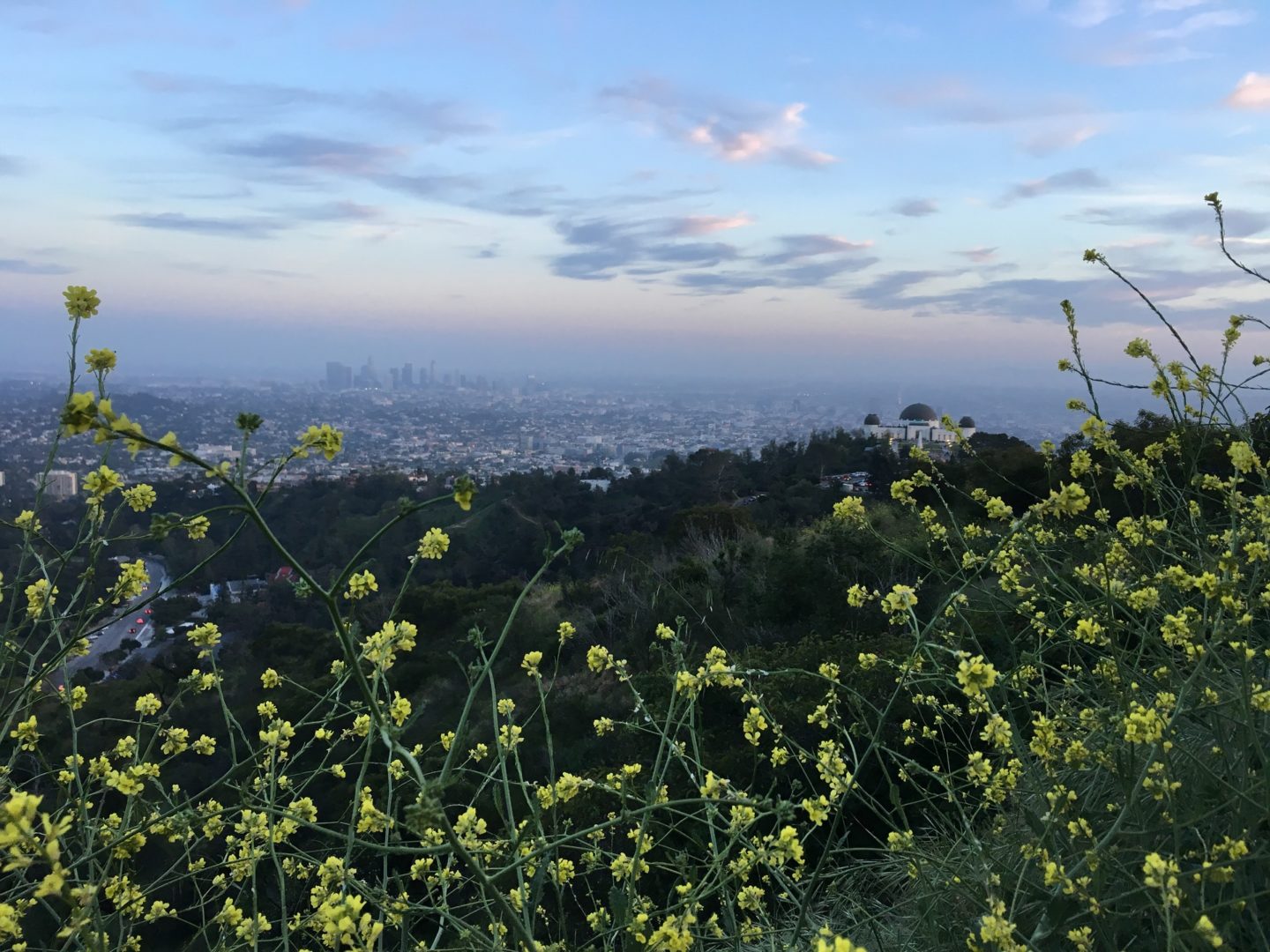
In April my girlfriend and I were in Temecula, riding horseback through the gentle hills of Southern California wine country. No matter that I hadn’t truly ridden in well over 10 years, or that it was her first time on a horse. It was as if our time spent playing Red Dead all these months had created a trustworthy facsimile of palpable experience. Tap X twice. How does that translate? Oh, yes. A gentle nudge with the heel. And we’re off. Just like 10 years ago. Just like last week.
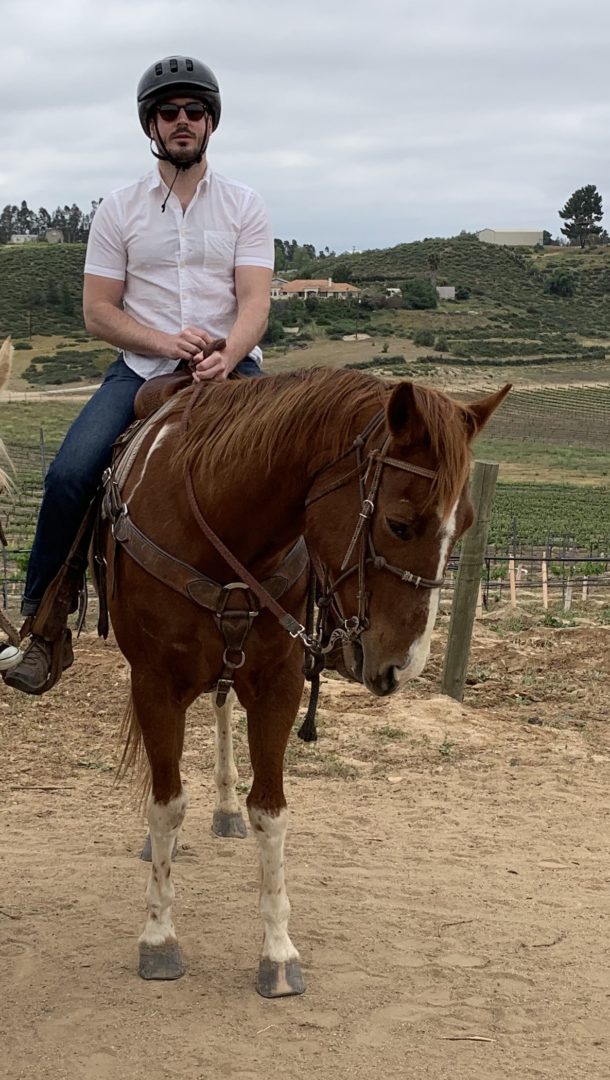
Credit: Jacob Farmer
If you made it to the epilogue of Red Dead Redemption 2, you’re all too aware of the folksy, musical, interactive house-building montage. It plays like Rockstar’s version of a heat check in basketball, in which they tested whether they could pull off anything in a game. It’s decidedly cheesy, but it’s also fun.
As I watched the mass of monochromatic lumber slowly form into the foundation of a catalog-ordered home, my clanking hammer falling in and out of rhythm with the song’s tempo, I remembered my dad telling me that the house he grew up in, one of the early suburban homes in Garden Grove, California, had been built by hand in a similar fashion by my grandfather.
At this point, the transformation in my waking life had nearly calcified. I was frying chicken in cast-iron skillets, day-dreaming of homemade cornbread recipes, polishing newly purchased leather boots, making coffee out of French presses. Woodworking, well, it was in my tactile memory, having done it as John Marston, having imagined it as my grandfather. Why couldn’t I do it now? My version of this—sanding and oiling a weathered deck bench—was, of course, much less impressive or significant. But the sense of accomplishment was real. Picture Hank Williams’s “Hey Good Lookin’” playing from a portable Bluetooth-enabled speaker, as I work the teak oil back and forth across the wood, into its uneven grains. In and out of time with the song.
Mount Shasta still looms behind us as we pass through Klamath Falls and into Oregon. Within hours we’re surrounded by thick snow and towering evergreens. The train curves gently to the right and I’m able to see the front of it, and the steel tracks we are riding upon. I imagine a collection of faceless workers below us, legs sinking in the snow, tools in hand, some of the many that were needed to ensure my decidedly unnecessary joy ride decades later.
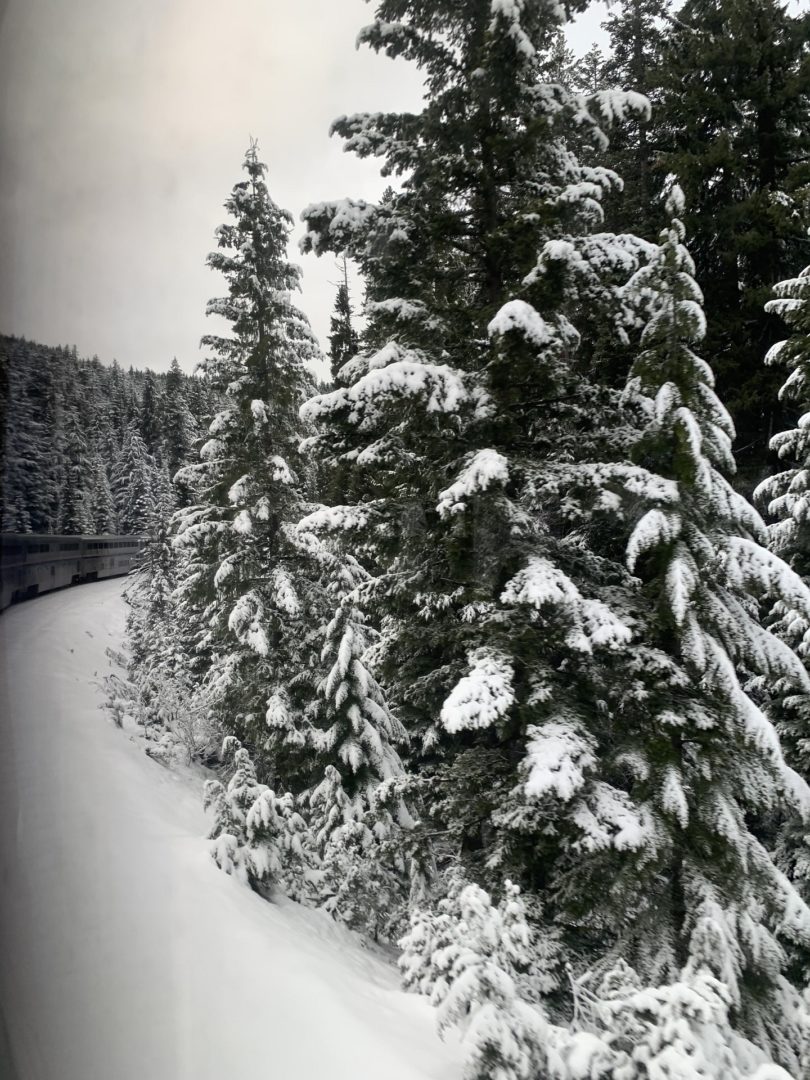
Credit: Jacob Farmer
My grandfather was once one of those workers. After serving as an Army Staff Sergeant in the Okinawa Prefecture during the American occupation of Japan, he returned home to the States in search of a new job. He was a young college-aged veteran, but he lacked formal education. He traveled to Arizona and, for a time, found his work along the railroad, helping to build a section of one of America’s most iconic symbols of progress.
His last name, like mine, was Farmer, a name that traces back to Old French and at one time meant tax collector. Despite this, my grandfather’s immediate ancestors were, in fact, farmers, one of the roughly 1.6 million families who were granted government land on which to farm as part of the Homestead Act. Signed by Abraham Lincoln in 1862, and lauded as one of the signature pieces of legislation that cemented America’s spread to the Pacific, the Homestead Act provided any adult citizen an opportunity to claim land in exchange for its cultivation. This manifestation of the “American Dream” also came at the expense of countless Native Americans, who were often left with the choice of dying for their land or making way for the predominantly white, Protestant settlers. The fallout of this choice can be seen throughout the states of the Great Plains and across hundreds of Native American reservations today.
Red Dead Redemption 2 brims with characters from this period, and its setting serves as a spiritual bridge between America’s postwar Reconstruction and subsequent continental expansion. See it in the farms across West Elizabeth and New Hanover, or in the bustling and beautifully rendered San Denis, an ode to the cultural melting pot of New Orleans. Meet Rains Fall, chieftain of the fractured Wapiti Indian Tribe, and learn how his people were systematically weakened by forced relocation and disingenuous peace negotiations with the U.S. government. These are not historical recreations of America’s past, but they aren’t quite satirical either. While toiling as a hand on Pronghorn Ranch, I, as John Marston, dream of one day having a small ranch of my own and, in a way, experience a possible version of what my grandfather’s grandfather went through in the years before acquiring his own little sliver of Texas farmland.
Decades later, these same Farmers weathered the Great Depression and the Dust Bowl, surviving their own destitution to flee west in search of new opportunity. Like the cast of characters in The Grapes of Wrath, some of the farming Farmers were cowboys, some were honest and hardworking, some were criminals. With a modern American lens we understand they were, in fact, privileged with opportunity, benefactors of a hypocritical, racist and unjust system. Still, they were decidedly poor.
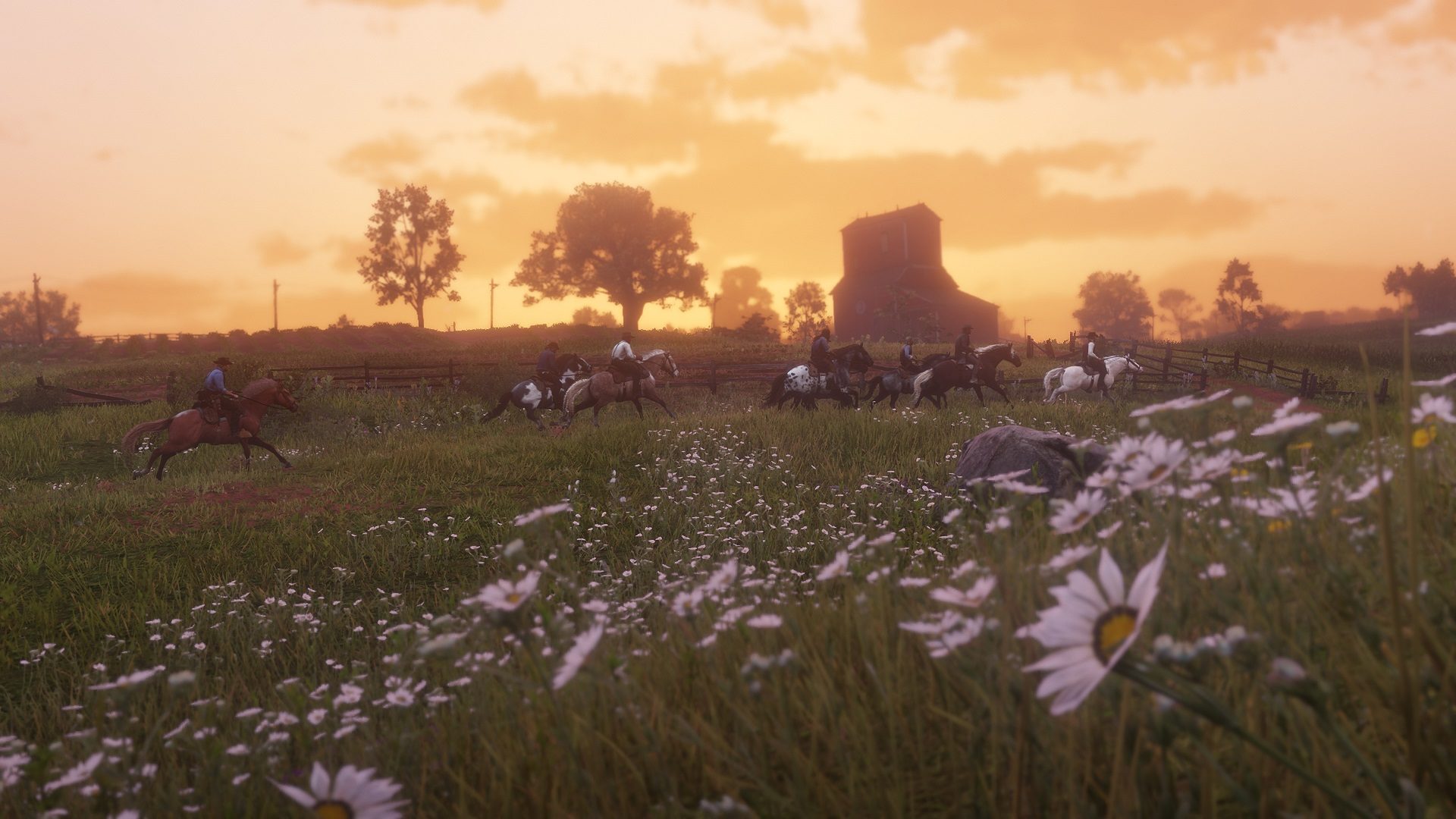
It’s after 9 p.m. as I depart the train in Lacey, Washington. Down the track, my girlfriend and her family greet me with goofy hats covered in festive, flashing lights. After two days spent with strangers, I’m thankful to see familiar faces. Tomorrow is Christmas.
I often forget that my grandfather passed away in this same town, the town I had traveled all this way, by train, to visit another family. It’s a fact of coincidence, of random people meeting in another place only to discover a surprising geographical connection. I forget because so much of my grandfather’s life was spent in Arizona and California, in “The West.” The land of altruistic cowboys and dusty guitar melodies. The setting of Red Dead Redemption 2. My grandfather represented a connection to a past, a topography, an idea, that was fascinating and, at times, if the story was told well enough, almost felt tangible. Stories can have that effect.
A great game can, too. The more we feel we are living out an experience, not through an avatar but as the avatar, the more real it becomes, and the more it feels like an active history. Something we can take with us, perhaps even use, when the game is over, and the waking life begins again.
Before fully succumbing to dementia, my grandfather spoke in loops. He would start a story and without finishing would manage to start it over again. His favorite topic around me was the Dust Bowl, perhaps because that was his life’s origin story. Hunched in a sofa chair, he would speak emphatically of human greed, mistakes in agriculture, and the need to rotate crops to replenish soil. Never a farmer himself, he spoke as though his last name carried some predisposed acuity on the topic. “Alfalfa,” he would say to me, over and over. “If only they had planted some alfalfa.”
In his final years, my grandfather lived near my uncle in a small nursing home deep in the woods of Lacey, Washington. His dementia had become severe, his memory fragmented, unreliable, the neurons firing and misfiring across the dimming synapses of his brain. As a result, an uneasy reality melded into fantastical ideations, like traveling through telephone wires to report on the incoming weather. (He had, in fact, been watching The Weather Channel. There was, in fact, a tornado last week. Miscalculations and anachronisms he would not be able to identify.)
The last time I saw my grandfather, I could not be sure if he knew who I was. He was already tucked into bed; my uncle, my aunt and I were sitting in wooden chairs beside him. After a few minutes of stilted conversation, my uncle decided to play an old song from his phone, a song I cannot recall, something from the ’50s, from his early childhood. To my grandfather, a demented man forged out of a Depression and a Dust Bowl, the possibility of hearing a song coming from a phone was not only incomprehensible, but also not worth considering. “By golly,” he said, in disbelief. “Where’d you get that record?”
We smiled amongst ourselves, and my uncle passed the phone to me. I tried a Hank Williams tune. My grandfather repeated the same phrase. “By golly, where’d you get that record?”
“We brought boxes of records,” my uncle said, grinning. “They are in a truck outside. We have everything you could possibly want to hear.” My grandfather smiled, his eyes closed now, somewhere far away, as he hummed softly to the melody. We continued on like this for some time, passing the phone around, choosing a song. Without saying it, we knew we had stumbled onto something both fictive and real. Something precious to be enjoyed, not analyzed. A line to the past, histories shared and unshared. Boxes of records. A great game.
“What would you like to play?” we asked him again and again, as the lights in the other rooms turned off around us.
“By golly,” was all he said, his swollen foot swaying back and forth on the bed. In and out of time.

Jacob Farmer is a television and freelance writer, and the sole man responsible for his father’s early retirement from gaming. If you played NHL 97 on SEGA Genesis, you may know “the move.” And if you know the move, you know it’s unbeatable. He has written for the television show iZombie, and co-created the indie web series Language Academy, which is both award-winning and largely unseen.